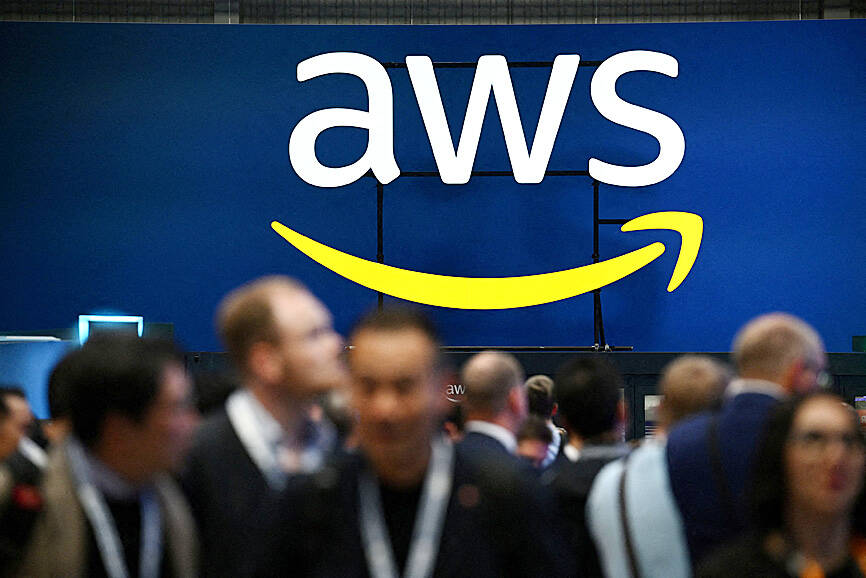State-linked Chinese entities are using cloud services provided by Amazon.com Inc or its rivals to access advanced US chips and artificial intelligence (AI) capabilities that they cannot acquire otherwise, public tender documents showed.
The US government has restricted exports of high-end AI chips to China over the past two years, citing the need to limit the capabilities of the Chinese military.
However, providing access to such chips or advanced AI models through the cloud is not a contravention of US regulations, as only exports or transfers of a commodity, software or technology are regulated.

Photo: Reuters
A Reuters review of more than 50 tender documents posted over the past year on publicly available Chinese databases showed that at least 11 Chinese entities have sought access to restricted US technologies or cloud services.
Among those, four explicitly named Amazon Web Services (AWS) as a cloud service provider, although they accessed the services through Chinese intermediary companies rather than from AWS directly.
The tender documents show the breadth of strategies Chinese entities are employing to secure advanced computing power and access to generative AI models. They also underscore how US companies are capitalizing on China’s growing demand for computing power.
“AWS complies with all applicable US laws, including trade laws, regarding the provision of AWS services inside and outside of China,” a spokesperson for Amazon’s cloud business said.
AWS controls nearly one-third of the global cloud infrastructure market, according to research firm Canalys.
In China, AWS is the sixth-largest cloud service provider, according to research firm IDC.
Shenzhen University spent 200,000 yuan (US$28,027) on an AWS account to gain access to cloud servers powered by Nvidia A100 and H100 chips for an unspecified project, according to a March tender document.
It got the service via an intermediary, Yunda Technology Ltd Co (成都運達科技), the document showed.
Exports to China of the two Nvidia chips, which are used to power large language models (LLM) such as OpenAI’s ChatGPT, are banned by the US.
Shenzhen University and Yunda Technology did not respond to requests for comment.
Nvidia declined to comment on Shenzhen University’s spending or on any of the other Chinese entities’ deals.
Zhejiang Lab (之江實驗室), a research institute developing its own LLM, GeoGPT, said in a tender document in April that it intended to spend 184,000 yuan to purchase AWS cloud computing services, as its AI model could not get enough computing power from homegrown Alibaba (阿里巴巴).
A spokesperson for Zhejiang Lab said that it did not follow through with the purchase, but did not respond to questions about the reasoning behind the decision or how it met its LLM computing power requirements.
Alibaba’s cloud unit, Aliyun (阿里雲), did not respond to a request for comment.
The US government is trying to tighten regulations to restrict access through the cloud.
“This loophole has been a concern of mine for years, and we are long overdue to address it,” US House of Representatives Foreign Affairs Committee Chairman Michael McCaul said in a statement, referring to the remote access of advanced US computing through the cloud by foreign entities.

INVESTIGATION: The case is the latest instance of a DPP figure being implicated in an espionage network accused of allegedly leaking information to Chinese intelligence Democratic Progressive Party (DPP) member Ho Jen-chieh (何仁傑) was detained and held incommunicado yesterday on suspicion of spying for China during his tenure as assistant to then-minister of foreign affairs Joseph Wu (吳釗燮). The Taipei District Prosecutors’ Office said Ho was implicated during its investigation into alleged spying activities by former Presidential Office consultant Wu Shang-yu (吳尚雨). Prosecutors said there is reason to believe Ho breached the National Security Act (國家安全法) by leaking classified Ministry of Foreign Affairs information to Chinese intelligence. Following interrogation, prosecutors petitioned the Taipei District Court to detain Ho, citing concerns over potential collusion or tampering of evidence. The

‘FORM OF PROTEST’: The German Institute Taipei said it was ‘shocked’ to see Nazi symbolism used in connection with political aims as it condemned the incident Sung Chien-liang (宋建樑), who led efforts to recall Democratic Progressive Party (DPP) Legislator Lee Kun-cheng (李坤城), was released on bail of NT$80,000 yesterday amid an outcry over a Nazi armband he wore to questioning the night before. Sung arrived at the New Taipei City District Prosecutors’ Office for questioning in a recall petition forgery case on Tuesday night wearing a red armband bearing a swastika, carrying a copy of Adolf Hitler’s Mein Kampf and giving a Nazi salute. Sung left the building at 1:15am without the armband and apparently covering the book with a coat. This is a serious international scandal and Chinese

Seventy percent of middle and elementary schools now conduct English classes entirely in English, the Ministry of Education said, as it encourages schools nationwide to adopt this practice Minister of Education (MOE) Cheng Ying-yao (鄭英耀) is scheduled to present a report on the government’s bilingual education policy to the Legislative Yuan’s Education and Culture Committee today. The report would outline strategies aimed at expanding access to education, reducing regional disparities and improving talent cultivation. Implementation of bilingual education policies has varied across local governments, occasionally drawing public criticism. For example, some schools have required teachers of non-English subjects to pass English proficiency

TRADE: The premier pledged safeguards on ‘Made in Taiwan’ labeling, anti-dumping measures and stricter export controls to strengthen its position in trade talks Products labeled “made in Taiwan” must be genuinely made in Taiwan, Premier Cho Jung-tai (卓榮泰) said yesterday, vowing to enforce strict safeguards against “origin laundering” and initiate anti-dumping investigations to prevent China dumping its products in Taiwan. Cho made the remarks in a discussion session with representatives from industries in Kaohsiung. In response to the US government’s recent announcement of “reciprocal” tariffs on its trading partners, President William Lai (賴清德) and Cho last week began a series of consultations with industry leaders nationwide to gather feedback and address concerns. Taiwanese and US officials held a videoconference on Friday evening to discuss the